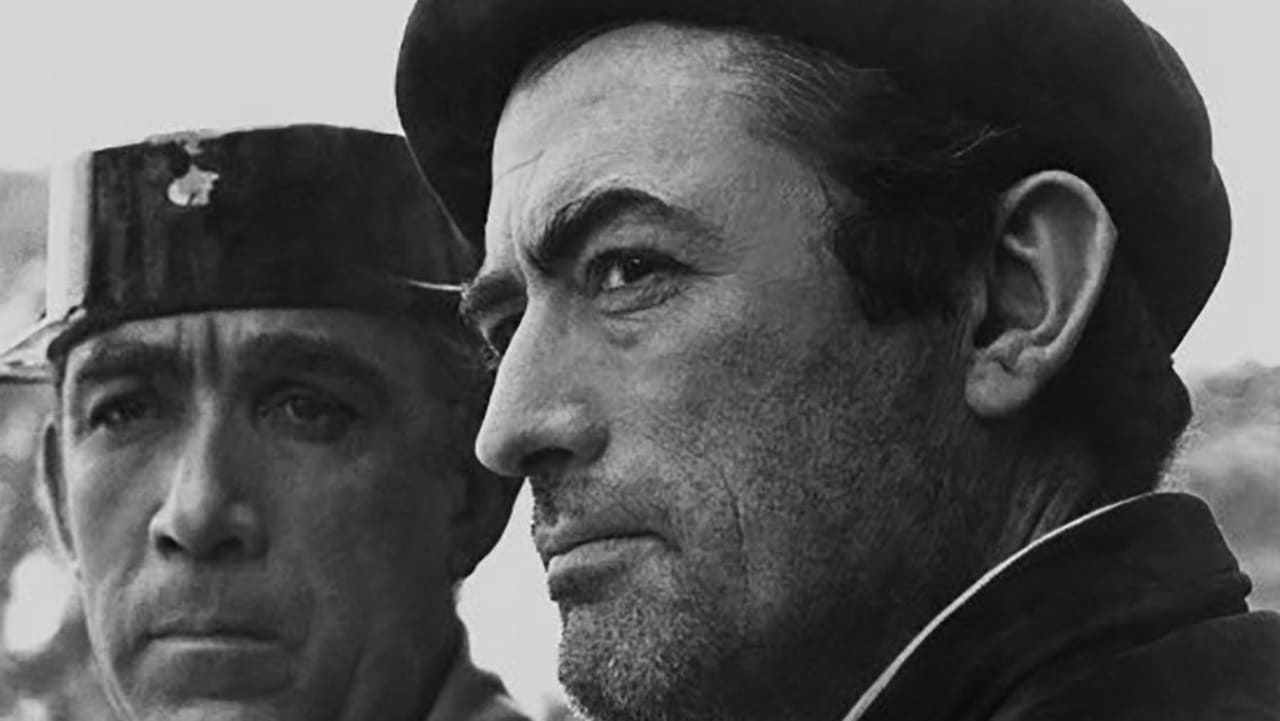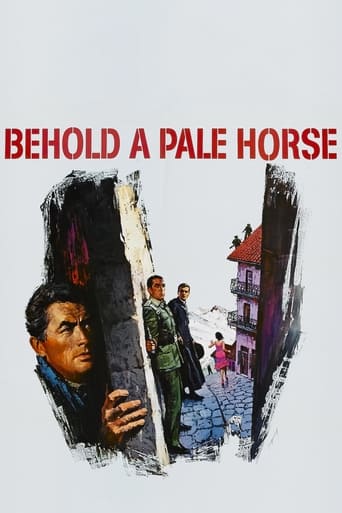Linbeymusol
Wonderful character development!
TrueJoshNight
Truly Dreadful Film
Pluskylang
Great Film overall
Brendon Jones
It’s fine. It's literally the definition of a fine movie. You’ve seen it before, you know every beat and outcome before the characters even do. Only question is how much escapism you’re looking for.
jazerbini
I got a DVD copy of "Behold a Pale Horse" and I can now after many years seeing it more calmly as I did a few times. It is a hymn to liberty and resistance to tyranny. Impressive in every way. A film that should make us wonder about its depth. Men who are murdered and banished from their homeland, children who lose their parents and grow up with the feeling of revenge. Mothers who die without the right to see their children banished to another country. Zinnemann made a masterpiece. The black and white only reinforce their distress. Peck have here a magnificent performance as the revolutionary Artiguez that an almost suicidal gesture, and that also deserves further analysis,back to their homeland, knowing that he would die, but why should it back to his mother and the boy who trusted him. The gesture is much more important than the continued oppression of Vinolas, Artiguez knew this would also end. At the end of the film there is the impression that Viñolas is the winner. Applauded by all those who live with tyranny, blind and cowardly. But Viñolas own wonders: Why Artiguez back? Each of us knows the answer: Artiguez returned to prove that it can be beaten but not defeated. His gesture fighting for freedom would bear fruit. Others would follow the the steps of Artiguez finally ridding Spain of terror that dominated the Franco era. A monumental wonderful work.
kayaker36
It wasn't all hysteria. There were Communists and Communist sympathizers in the movie business. Several were involved one way and another in the making of this didactic film. This picture with its heavy political message about the backwardness and repression in Spain under Franco could never have been made in the United States although two American actors share top billing.There is some fine acting here but not by Gregory Peck. He does not make a convincing European. Nor does the brutishness of his character fit the man of integrity audiences had come to expect this great star to portray. On the other hand, the restrained performance by Anthony Quinn makes his **Guardia** captain the most complicated and interesting character in the movie. Unlike his adversary, this man has no illusions. He knows he serves a regime that rules by fear though he is outwardly courteous to everyone. A married man, the address and telephone number of his mistress are common knowledge at police headquarters. Yet he prays with apparent sincerity to the Virgin for success in the upcoming confrontation. You really wish there were more of him but he has little screen time--one of the movie's major faults.Big, handsome Christian Marquand from Marseilles, France is outstanding as Quinn's able and tactful lieutenant, and as Pilar, mother to Peck's character and an unreconstructed, anticlerical leftist, American Mildred Dunnock is remarkably convincing in a small role. Having been brought **in extremis** to the local hospital, she sends a priest who has come to her bedside away with the suggestion he "go and bless the rifles in the firing squad".The documentary footage of the pilgrimage site at Lourdes, France is a gratifying bonus, along with some impressive shots of the Pyrenees. In truth, the cinematography is first rate throughout, a Fred Zinneman trademark.The shortcomings in the film center around the screenplay. There is too much talking as many others here have remarked, the movie is tedious in places and about fifteen minutes too long. The device of having much of the action viewed through the eyes of a child simply doesn't work.Many have noted that Peck and Quinn had appeared together in the 1959 blockbuster "The Guns of Navarone". Along with composer Maurice Jarre, several actors from "Lawrence of Arabia" are reunited in this picture, also. There is Quinn, Omar Sharif as a priest facing a moral dilemma and in an odd bit of casting, Anglo-Pakistani Zia Mohyeddin. He plays a guide--the same role he had in "Lawrence" but this time he survives.
Raghavendra Rao
I watched this movie, and like most of the people have already expressed it, must say that this is truly a classic. The acting crew is excellent with Peck, Shariff and Quinn giving some very intense performances. But the surprise package is the boy who crosses over to the French part where he goes in search of Manueal to ask him to avenge his father's death at the hands of Vinollas. I often read comments that Peck is stuff or wooden on occasions, but I find him one of the most intense actors because of his ability to convey through his eyes. Like most actors, he is gifted of conveying a lot more through his eyes than his body might suggest. He conveys the frailing Manuel artigez here very well. We know that Manuel is tired and wary of the struggle he has pursued so passionately. Full credit to Peck for portraying that very effectively. Omar Shariff is also brilliant as the confused priest. Quinn is natural and we feel a certain angst against him, I do not know why. The end is excellent which again, conveys the human side of Manuel very well. All in all, an excellent movie worth watching on a calm Sunday afternoon.
ewarn-1
This is a film which has almost faded into total obscurity, and that's tragic, because it's well worth seeing. It's sort of a thinking person's suspense movie, better appreciated if you know some details about the intricate historical background in which it is set. Even so, it can be appreciated for its dramatic settings and characterizations. It has a complicated plot, to be sure, but the story rolls right along...not a lot of action until the end, but the tension builds steadily. I'm no fan of Peck, but his role here really drew me in. He looks beaten down by a hard life and way too much unhealthy passion. Quinn doesn't have much screen time, but I liked some of the minor characters best...their faces were great. The credit sequence, meshed together perfectly with newsreels, shows a long line of defeated soldiers, their faces reflecting defeat and confusion... a great tracking scene.Here are some reasons I think the film is unknown: 1. The main character is an atheist communist anti-catholic guerilla bandit. Not a popular icon in American movies. 2. Complex historical background. 3. Knowledge of political situation in Spain a minimum requirement. Not a priority on many American's lists. 4. Black and white photography in 1964. (Hey, I liked the scenery...but you always wonder how it would look in color...and this was a late date for a black and white feature film.) 5. Civil War movies (even Spain's) always run a risk...you might alienate half the audience.

